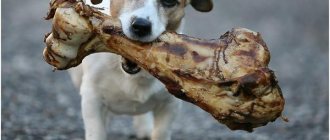- 28.01.2017
- Animals, Dogs, Articles, Explanatory
This article doesn't have a fancy introduction. I would like to avoid empty phrases about what a four-legged friend meant in the life of a loving owner. How to survive the death of a dog or help loved ones who find themselves in a similar situation? The materials in the article are based on the work of psychology professor Fyodor Vasilyuk and the experience of dog breeders who also experienced the death of their pets. We really hope that our advice will help you.
He wasn't "just a dog"
The owner of a deceased dog often faces misunderstandings from those around him - after all, we are talking about the death of an animal. There are also those who twirl their finger at their temple: “It’s just a dog, take another one!” What problems?" But there are also quite serious problems. Lonely people feel the death of their four-legged friend especially acutely. Having lost the object of care, they lose support and joy of life . If there was a close emotional connection between a person and a dog, the pain of losing it is comparable to the pain of losing a loved one. And this is not an exaggeration.
What is the loss of a pet from a psychological point of view?
For many people, a dog is not just an animal, but a real member of the family. The owner remembers all the moments associated with his pet. Therefore, the loss becomes very difficult, it is as if a person is deprived of a loved one. From a psychological point of view, the explanation is simple - people lose the source of unconditional love.
Dogs can die after a long illness
The animal may die suddenly. Being hit to death by a car, a heart attack, or simply an insect bite - these reasons are not rare.
How to survive the death of a dog, psychology of grief: 5 main stages
When left face to face with your misfortune, do not try to overcome it immediately. Psychologists identify 5 stages of experiencing severe grief, through which, to one degree or another, everyone goes through.
Stage one: shock
The depth of emotional shock depends, first of all, on the degree of surprise of the event. The sudden death of a young, healthy animal (accident, poisoning) can cause real shock. But sometimes, despite expecting a close ending, a person finds himself emotionally unprepared for the last breath of his beloved dog.
This stage is characterized by automatic actions, slower movements and speech, insomnia, lack of appetite, and general weakness caused by severe stress. The brain, defending itself from unbearable mental pain, seems to block feelings, suffering “rolls in waves.” The first stage can last from an hour to two weeks.
Stage two: denial
The owner subconsciously refuses to accept the death of the pet:
- catches himself thinking that he needs to hurry home (the dog hasn’t walked yet, hasn’t eaten, he’s waiting);
- can sense her presence (hear whining, the sound of footsteps);
- behaves as if the beloved dog is still nearby (talks to him);
- the idea of removing the collar, bowls, toys (everything related to the dog) is perceived as a betrayal;
- Another manifestation of denial is the desire to immediately adopt another dog to fill the void. It's better not to do this for now.
The second stage lasts about a month.
Stage three: aggression, guilt
At the stage of aggression, the psyche finds a saving straw - the search for the culprit. Questions arise: “How to survive the death of a dog?”, “Who is to blame?” Panic and self-flagellation are added to the pain. “If I hadn’t unfastened the leash then!” (had time to see the doctor, walked more, stayed at home, took better care of the animal, and so on). Such manifestations of the grief mechanism are natural: the subconscious seeks protection from pain and creates the illusion of control over the circumstances of the past.
Understanding the inevitability of such thoughts, remember: drowning in your own guilt is dangerous ! This can lead to serious neuroses!
Blame: coincidences, an inattentive driver, illness, fate, in the end. Nothing can be changed: neither then nor now.
Stage four: deep grief, depression
The period of the most intense mental suffering is accompanied by a feeling of emptiness and loneliness. The person withdraws into himself and avoids contact if possible. It is very important here to let go of the pain so that memory can replace it.
Stage five: acceptance
“Grief cannot be avoided, it can only be experienced,” people say. Experiencing grief ends in about a year. A person who has lost a dog finally accepts the fact of its absence, establishes a new way of life, distributes time differently, and learns to remember only bright moments.
How long will the grief last?
The main thing to remember is that grief takes time. You will always miss your companion, but things will get better. At first there will be more bad days than good ones.
Then you will find that the bad days and the good days are equal. Soon you'll have fewer bad days and it'll be easier to focus on happy memories with less sadness.
Your pet's memory can always be bittersweet for you.
Future pets can't replace your lost companion, but they can help fill the void. Just remember to wait for the right time.
It is an unfortunate reality that people will most likely outlive their pets. All you can do is be grateful for the short time you get to share your life with these fellows.
Give yourself time
The process of experiencing grief does not need to be forced or rushed. There is no set schedule for him. Naturally, we want unpleasant emotions to end as soon as possible. However, by holding back our feelings and denying sadness, we only postpone the confrontation with negative emotions. If you feel like crying and screaming, find a safe place to do it. Don't hold back. It is also very important not to blame yourself for the long experience of grief - each of us has our own pace.
“It is important to go through all the stages of acceptance and experience all the emotions that arise during this process - grief, guilt, depression, and emptiness inside. This is important for long-term well-being. If people prevent themselves from feeling sad, nostalgic, and in pain, this can have a negative impact on psychological well-being.”
Svetlana Suleymanova
Characteristic manifestations
Even thoughts about the possible departure of a partner from your life can be frightening.
If a husband is afraid of losing his wife or a woman is afraid of the possible loss of her husband, then you can often hear about this. But sometimes people do not express themselves directly, but carry their experiences inside or do not themselves realize that they are experiencing such fear. But at the subconscious level this is all reflected. The following manifestations may indicate that you are afraid of losing your loved one:
- a strong need to constantly be close to your significant other;
- feeling of increased anxiety;
- a feeling of strong discomfort at the moment when you need to part with your partner, even if only for a short time;
- a state of stress if the partner does not come home from work for a long time;
- the appearance of all kinds of thoughts that excite the consciousness;
- the need to keep everything under control;
- constant calls to your partner, questions about where he is now;
- expectation that something bad will happen;
- the inability to calmly react to the need of a loved one to go on a business trip;
- the appearance of a fainting state just from the mere thought that your partner might leave you.
Somatic signs may include the following:
- tearfulness;
- insomnia;
- severe fatigue;
- headache;
- in the absence of a partner for a long time, panic attacks may occur;
- increased sweating;
- dizziness;
- tachycardia;
- surges in blood pressure.
Help at every stage
Day 1 Actions
The need to organize a funeral for the animal will help stop the first shock. After the mournful duty is completed, return home; perhaps family members need your support. If you are alone, do some cleaning, washing the dishes, whatever you can do to avoid wandering aimlessly around an empty house. Do not neglect therapeutic doses of sedative (valerian, motherwort).
Take care of yourself.
As much as possible, maintain your usual sleeping and eating patterns. Don't go from one extreme to another. Starving or “eating” your grief, trying to drown it out with alcohol is equally useless and will not bring relief.
Be natural in your expressions of emotion.
Cry if you want to cry, scream if you want to scream. After the tears, emotional devastation sets in, but it becomes easier. You can’t be ashamed of your pain and bottle it up inside.
Don't cultivate denial.
As quickly as possible, remove the dead dog's equipment: from a leash to a favorite rug. If you are not yet ready to simply pack all your things into a bag and take them out, then temporarily put them in a closet or pantry. You can take the collar and go for a walk to your dog's favorite places. Capture all the details of the surrounding world: blue sky, birdsong, wind blowing
This is important to keep in touch with reality and distract your thoughts. At the end - leave the unnecessary things and say goodbye
Someone floats a collar along the river and hangs it on a tree branch. The main thing in this technique is the feeling that you did everything right.
Don't rush to look for a replacement.
Trying to quickly “replace” one pet with another will not lead to anything good. A puppy, even of the same breed, will never become an exact copy of its departed friend. A new family member should only enter the home when you are fully prepared emotionally.
Share your grief.
By speaking out negative emotions, you weaken them. Share your pain with friends and loved ones. If there is no person around you to whom you can open your soul, use the Internet, a helpline. There are many threads on dog lovers’ forums on the topic: “How to survive the death of a dog,” where people share memories, fears, and support each other. For some, such communication has become a real salvation.
Keep a diary
Buy a nice notebook and write down your thoughts. Tell the paper what you told your dog before, describe all the feelings you experience. But just don’t contact the deceased pet, don’t even talk to him mentally. He is no more, no matter how scary it is to realize it
Create a memory album.
The desire to return everything only increases suffering: remember, but do not regret. Organize memories of your dog in an album. There you can paste her photographs, puppy card, pedigree, veterinary passport. Under each photo, tell a funny story from your walks together or dog pranks.
• Draw from memory a damaged chair or a pair of Italian boots chewed by your pet as a child. This technique will gradually replace pain with memories.
Give kindness.
Volunteering, helping shelters or a specific animal in trouble will help you cope with feelings of guilt, survive the bitterness of loss, and feel needed again. And who knows, maybe just like that, you will find a new friend.
Friend for an elderly dog
Many owners, when their dog reaches old age, get a second dog in advance, so as not to be left alone later. This situation requires an individual, skillful approach and tact. But in the case when the pets find a common language, the young friend is able to extend the period of activity of the old man, as if sharing his vital energy. There is no scientific explanation for this, but the fact remains.
Take care of yourself
During periods when you are experiencing particularly intense sadness, it is important not to forget about your mental and physical health. Yes, it will be difficult, so the easiest way is to make a list with the items you need to keep track of daily:
- take a shower;
- have breakfast, lunch and dinner regularly;
- do light exercise;
- Go for a walk at least ten minutes a day.
Think about everything you do regularly and try to continue doing it. Don't forget to praise yourself for small changes - if you were able to calmly look at photos of your pet or didn't cry at the memory, make a mental note and be happy about it.
Who is guilty?
The main problem that prevents people from experiencing grief is the search for someone to blame. It doesn’t matter what exactly happened, instinctively, a person looks for those responsible for what they did, let it be God or evil fate, but the accusation will find the defendant.
It is much worse when the owner blames himself for the death of the pet - “I didn’t have time,” “I didn’t notice,” “I made a mistake in choosing a veterinarian.” Finding someone to blame applies to situations where a pet leaves due to illness or an accident.
Naturally, you should not wait for the fateful hour; you need to take care of your friend while he is alive and well - proper nutrition, vaccinations, safety, care, regular veterinary examinations. The more responsible you are about your basic responsibilities, the faster you will be confident that you did everything right when the time comes to cope with the loss of your dog.
A separate topic for discussion is euthanasia. Many owners refuse to humanely euthanize an animal, considering it murder. In fact, a hopelessly ill dog suffers only because the owner’s inner selfish child cannot accept reality. If you are gnawing at guilt, atone for it in any way available to you. Contact an animal shelter, become a volunteer, pick up a kitten on the street, wash it and find it a home.
Do good, save lives, feeling important will help you forgive your “mistakes.”











